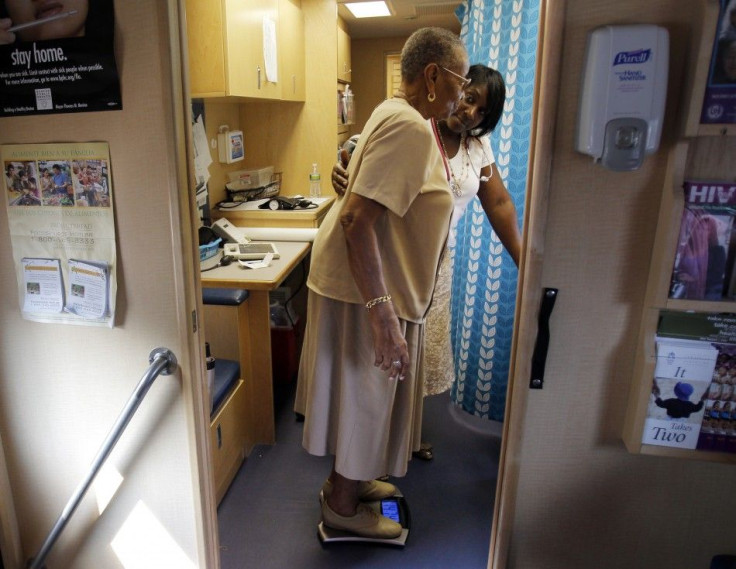Super Committee Should Not Be Bamboozled By Sham Medical Claims
Opinion

The drum beat to limit medical care for the elderly grows louder. President Barack Obama's health law reduces future funding for Medicare by over $500 billion in the next decade and shifts most of those resources to fund a vast expansion of Medicaid. It's like robbing grandma to spread the wealth. To bamboozle the public, advocates for limiting health care spending on the elderly are distorting science to make their case.
The British medical journal Lancet reported last month that 32 percent of elderly American patients undergo surgery in the year before they die, a statistic culled from Medicare data. Media outlets all across the United States interpreted the information as a call to action to reduce costly surgeries, intensive care stays and other high-intensity care for the elderly.
Don't be hoodwinked by the use of that statistic. The Lancet investigators looked only at patients who died, making surgery appear unsuccessful. Investigators should have considered how all surgery patients fared, including those who recovered, returned home from the hospital and resumed active lives. Research shows that surgeries on older patients are generally successful.
A 2003 study in the Journal of the American College of Cardiology followed 220 patients age 65 and older who underwent heart-valve surgery. The study concluded that age does not appear to limit the health related quality of life benefits of surgery. Even patients over 75 had symptom relief and improvements in quality of life on a par with improvements seen in younger patients.
The decision to operate should be based on a patient's ability to benefit, not age. Dr. Martin A. Makary of Johns Hopkins has developed a way to gauge readiness for surgery with his well-known, 10-minute frailty test. It identifies which older patients have the physical reserve to withstand the stress of surgery and resume an active life.
Some people argue the elderly are consuming too many medical resources that should be reserved for younger patients. That's a viewpoint. But research should not be rigged to prove that withholding care from the elderly is harmless.
Obama's former budget director, Peter Orszag, told reporters in June 2009 that the president's plan to cut future Medicare funding would not be dangerous. He said spending could be lowered by about 30 percent, to approximate what is spent in the lowest-cost regions of the country, without doing harm. Behind that claim is such rigged research.
Orszag cited the Dartmouth Atlas of Healthcare 2008, which tried to prove that Medicare patients who got less care (fewer hospital days, doctor visits and imaging tests) had the same outcomes as patients who received more care. But the Dartmouth investigators had pulled the same trick as the Lancet investigators: They examined only the records of patients who died. By definition, such patients -- regardless of their level of care -- ended up the same: dead.
Statewide studies in California and Pennsylvania have proven the opposite of what the Obama administration claims. They show that Medicare patients treated in lower-intensity, lower-cost care hospitals have a higher risk of dying.
The California study, published in February in the Annals of Internal Medicine, found higher death rates from pneumonia, congestive heart failure, stroke, gastrointestinal hemorrhage and hip fractures at low-spending hospitals. The study's authors calculated that 13,813 California patients treated for these conditions between 2004 and 2008 would have survived had they been treated at higher-spending hospitals rather than low-spending ones.
Doctors often cannot tell when a patient is in the last year of life. When they can predict it, they expend fewer resources.
Washington's budget-cutters should weigh these findings. Further slashing what hospitals are paid to care for the elderly -- as the Obama health law and the Aug. 2 debt-ceiling deal both did -- will not only reduce end-of-life care; it will also reduce care for patients who are capable of surviving their illness and going home.
It is in this context that calls for less care is suspect.
In a recent article H. Gilbert Welch and colleagues at Dartmouth Medical College tried to counter the message so often uttered by breast cancer survivors: a mammogram saved my life. (Archives of Internal Medicine, October 24, 2011) Welch's message is that a majority of breast cancer victims whose cancer was detected by a routine screening do not owe their lives to that screening-- they would have survived anyway because of aggressive treatment after detection or because the cancer was slow growing.
All that is true, but don't fall for this argument to skip your routine mammogram. The data also show that approximately 13 percent of 50-year-old women with screening-detected breast cancer would have died if they had not been routinely screened. They owe their life to that routine test. That is a significant number. For 70-year-old women, the figure is even higher -- far too high to dismiss.
The Joint Select Committee on Deficit Reduction, which is charged with devising a plan to reduce federal deficit spending by November 23, should look beyond the sham medical statistics and get the facts.
Pitting grandma's well-being against the nation's fiscal health is a false choice. Future healthcare spending can be reduced significantly by repealing the vast expansion of Medicaid before it goes into effect in 2014, as well as costly health programs in the Obama health law that are designed primarily for illegal immigrants.
After all that is done, if more spending reductions are needed, they can be achieved by adjusting Medicare's eligibility age and asking some elderly patients to share more of the cost of care. These are safer options than denying care at grandma's bedside.
Ms. McCaughey, author of The Obama Health Law: What It Says and How to Overturn It (Encounter, 2010), is a former lieutenant governor of New York.
© Copyright IBTimes 2025. All rights reserved.





















